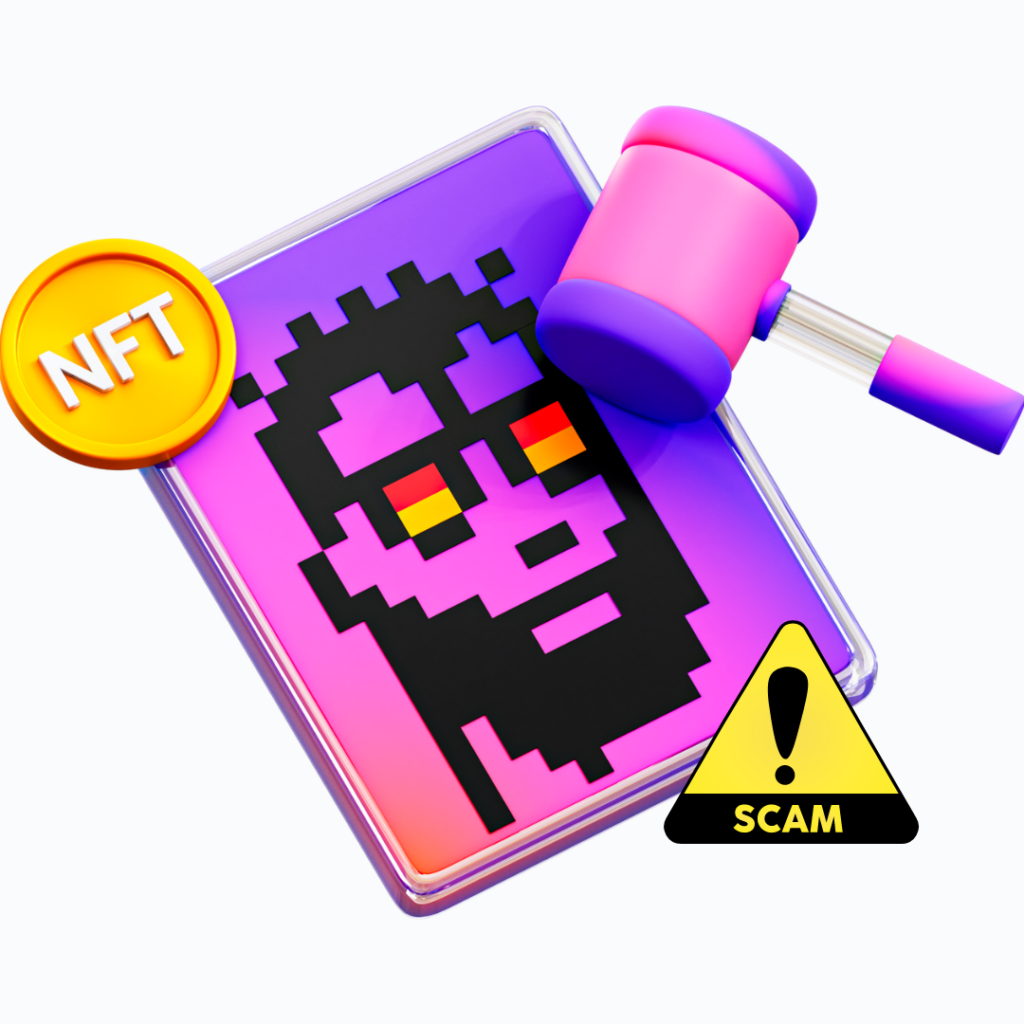Crypto Scams: 8 Most Common Scams and How to Avoid Them
Where there is money, there is always someone trying to steal it from you. And the crypto world is no exception to this unfortunate reality. In fact, crypto scams and hacks have been more prevalent than ever before.
Just last year, we witnessed what probably is the biggest crypto scam to date – the FTX collapse. According to data, more than $4 billion worth of crypto assets were lost to scams last year by November 2022.
As crypto continues to gain popularity and become more mainstream, scams and frauds are only likely to rise. The biggest factor contributing to people falling victim to these scams is simply a lack of awareness about crypto scams.
But don’t worry. This guide here will equip you with the knowledge and tools needed to identify and avoid these scams.
What are Crypto Scams
Crypto scams refer to fraudulent schemes designed to deceive the average person into investing their hard-earned money into fake investment opportunities.
They do this by creating fake websites and social media accounts to gain trust and relevance from potential victims before stealing and disappearing with their funds into thin air.
What makes crypto a particularly attractive target for these con artists is its high level of anonymity and the lack of regulations, making it a real challenge for authorities to track them.
Plus, not everyone understands the intricacies of crypto and blockchain technology, making it a perfect playground for new and inexperienced investors who are more likely to fall for these scams.
But learning about the different crypto scams and how they lure you into them can help you identify and avoid these scammers.
Types of Crypto Scams
Although these con artists always come up with new tactics and tricks to scam people, we can roughly categorize the most common types into these 8 categories.
Phishing Attacks

Phishing attacks have been around in every sector, and crypto is no different. The way phishing attacks work is – the scammer will send an email or message on social media or your phone number with a link to a website that may seem legit but is fake (for instance, a fake Binance homepage) and designed to steal sensitive information (e.g., private keys).
Sometimes, these links can be tricky to identify. For instance, you may receive a link to “Binance.co” instead of “Binance.com”, and you might only see the name “Binance” and click on it, thinking it’s the real deal.
That is why the best way to protect yourself from crypto phishing attacks is to avoid clicking on any suspicious links sent by unknown people on social media and emails.
SIM-Swap Crypto Scams

SIM-Swap crypto scams are among the newer ones but are quickly rising at an alarming rate.
The idea behind SIM-Swap scams is – the scammer tricks the network carrier into diverting calls and messages sent on your SIM to theirs. By doing this, they gain access to your sensitive information, like passwords and private keys, by falsely verifying their identity as yours.
You can protect yourself from SIM-Swap attacks by asking your network service provider to prevent unauthorized transfers or ports. Alternatively, you can avoid using SMS authentication methods for resetting your crypto wallets and exchange accounts.
Fake Crypto Exchanges and Wallets

Fake crypto exchanges and wallets are the equivalents of fake ads on sketchy websites that promise 50 pounds of weight loss in less than a week. These are websites and platforms created specifically to steal your crypto assets.
The easiest way to avoid these scams is by only using reputable crypto exchanges and wallets with established credibility. Check our list of best crypto exchanges section to find some.
Fraudulent Investment Managers

The fake investment manager scam is a common technique that has been around for years.
This is how it works – you’ll receive a call, message or email from an “investment manager” offering you a very lucrative crypto investment opportunity with promises of guaranteed high returns. Unusually high returns. By this time, you already suspect a potential fraud. So, you ask – “What’s the catch?” And they respond – “Well, you have to pay an upfront fee first”.
Most adults with enough life experience can easily spot these when they see one, and they are smart enough not to fall for it. Nonetheless, we must still warn you against these so-called “investment managers”.
Rug Pulls or Pump and Dump Schemes

Rug pulls, or pump-and-dump schemes, are very typical in the crypto space. Every day, there are hundreds and thousands of new coins launched with the intent to pump and dump.
The idea is simple – launch a new cryptocurrency, create hype through social media campaigns, or sometimes, even celebrity endorsement, get more and more people to buy the coin to drive up its value and then cash out and bail.
Sometimes, these scams are carried out by the developers themselves, and sometimes, by bad actors in the markets, like crypto whales who buy a huge number of coins to drive up their value only to sell them at a high. Bitconnect (BCC) is one of the biggest rug pulls in the history of crypto. Read more about it here.
Check out our guide to rug pulls, where we discuss it in-depth and explain how to avoid them.
NFT Scams

There are two kinds of NFT scams. One that is pretty much the same as the pump and dump schemes but with NFTs. And the second, where scammers create replicas of popular NFT collections, like the Bored Ape Collection, with similar-sounding names to trick people into buying their NFTs.
You can easily avoid these NFT scams just by verifying a few key metrics.
Crypto Scams on Dating Apps

According to a report by FCC from 2022, $185 million worth of cryptocurrencies were stolen in dating apps and romance scams.
The idea is simple – one party will message the victim through different social media channels, mostly on dating apps. The scammer will then “charm” their way into gaining the other party’s trust, after which they can use pretty much any of the methods mentioned in this article to scam them.
Avoiding these crypto dating and romance scams is simple. The point of online interactions is to eventually turn it offline, especially in the context of dating. So, don’t trust anyone you meet online unless you’ve met them in real-life multiple times.
Upgrade Scams

Upgrade scams are when you’re offered to download malicious software or virus disguised as an upgrade or a new version of a crypto wallet or exchange you use, often with promises of improved security or functionality.
These “upgrades” are designed to steal your private keys and passwords, allowing scammers to drain all your funds.
Unfortunately, these scams are becoming more prevalent as upgrades are quite common in the crypto space. Even the developers of Ethereum had concerns over potential scams during the Ethereum Merge upgrade, so much so that they had to issue a notice to all users to be wary of these upgrade scams.
How to Identify (and Avoid) Crypto Scams
Now that we know the different types of crypto scams. Let’s find out what are some consistent themes and signs that may help you identify and avoid most scams.
Sketchy or Unsecured Links and Websites
As mentioned before, anytime you receive a suspicious link from an unknown person on the internet, chances are that it’s a scam.
Always check links before clicking on them, and make sure they don’t seem too sketchy. Also, install an antivirus on all your devices. It will prevent you from going on fake and unsecured websites, most of the time.
Too Good to Be True Deals
We’ve already heard it before. If something’s too good to be true, it’s probably not. Keep this in mind every time someone tells you to buy a new coin or offers stupendously high returns on investment.
Asks for Money Upfront
We always sense something fishy as soon as someone asks for upfront money. But even then, the best of us falls into the trap of believing a lie we knew we shouldn’t have.
Unless you know the person very well, never fall for someone asking money upfront before delivering on their end of the deal. The investment manager scam is a great example of this.
Unknown Companies or Founding Members
If a company or its founding members have no past track record of work that establishes credibility and trust, avoid them.
While unknown companies or founding members don’t always translate to a crypto scam, it’s better not to take your chances and steer away from such companies. Instead, use famous and reputable platforms for your crypto transactions.
How to Recover Assets Lost in Crypto Scams
To be completely honest, it’s very unlikely that you can recover your assets lost in a crypto scam.
However, you should still report the scams to the relevant authorities. While crypto transactions are anonymous, they are not untraceable. If the scammer is relatively inexperienced, there is a slight chance you can recover your crypto assets.
In case you can’t, your next best option is to report them stolen on your tax report and claim losses. This will help reduce some of your tax liability and make up for the losses to some extent.
Different countries have different tax laws on stolen crypto. Learn about yours and preferably consult a tax professional.
Final Thoughts
Unfortunately, crypto is filled with scams and attacks. But that is the price for increased control, privacy and decentralization. Ultimately, the best we can do is exercise caution and stay informed on the different new strategies and techniques fraudsters are using to scam people.